
SEOUL, October 17 (AJP) - Korea is considering expanding its organ donor eligibility to include patients who experience cardiac arrest after withdrawing life-sustaining treatment, joining a small group of countries that permit organ donation beyond brain-dead cases. The move comes amid an acute shortage of transplantable organs, with patients waiting an average of four years for a transplant.
Whether the policy change can meaningfully ease the growing backlog remains uncertain, given Korea’s traditionally conservative views on organ donation.
The Ministry of Health and Welfare on Thursday unveiled its first Comprehensive Plan for Organ Donation and Transplantation (2026–2030), which includes allowing donations from patients who have given prior consent for both the discontinuation of life-sustaining treatment and organ donation.
Under the proposal, organ donation would be permitted after cardiac death—once life-support systems are removed and death is confirmed. Similar frameworks have long been implemented in the United States, the United Kingdom, and Spain.
“I’ve already registered as an organ donor,” said Kim Eun-jeong, a 58-year-old travel specialist who has signed documents for both treatment withdrawal and organ donation. “But I worry that if any of my family members object when the time comes, my wish may not be honored.”

In Korea, even if a patient chooses to withdraw life-sustaining treatment, the process cannot proceed if any family member opposes it. The restriction often prevents individuals from making their own end-of-life choices, fueling debate over whether family consent should outweigh personal autonomy.
The government aims to raise the national organ donation registration rate from 3.6 percent in 2023 to 6 percent by 2030, and increase the number of brain-dead donors per million people from 7.8 to 11 during the same period.
Yet demand continues to outpace supply. The number of patients on transplant waiting lists has surged from 43,182 in 2020 to 54,789 in 2025, while the number of donors fell from 478 to 397. On average, candidates wait four years, and as long as seven years and nine months for kidney transplants. Roughly 8.5 people die each day while waiting for an organ.
Copyright ⓒ Aju Press All rights reserved.


